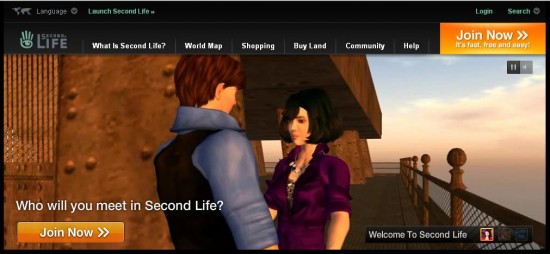Utherverse, a proprietary virtual world platform known for its adult content, has launched a virtual casino targeting US customers. While the winnings cannot be converted into cash today, that might change if a new gambling bill is able to make its way through Congress. Meanwhile, Utherverse hopes that casino operators will take a look at the platform and consider it for their casinos.
Vancouver-based Utherverse Digital Inc. is the company behind the Red Light Center (not safe for work), which claims over 6 million registered users, and the Virtual World Web, which claims to host over 30,000 private worlds — and its marketing focuses on the adult aspects of the platform.

Utherverse’s latest offering, Tiberius Casino, is part of the Red Light Center, and offers slot machines and table games in an immersive environment.

“The Tiberius Casino is a play-for-fun casino, so users play with chips,” Utherverse CEO Brian Shuster told Hypergrid Business. “Chips cannot be cashed out for anything, though they can be used to obtain virtual world properties and to send virtual gifts.”
Since no cash changes hands, the Tiberius isn’t subject to regulatory oversight.
But for those who are located in jurisdictions that do allow online gambling, the Red Light Center is also home to real-money casinos, such as the Golden Palace.
“These casinos operate according to the laws of their jurisdictions,” Shuster said. “We anticipate a rush of development of next-generation casino games that lend themselves to the multi-player environment.”
Shuster isn’t alone. There are at least two groups currently developing casinos for the OpenSim platform — which allows a casino to be hosted on any server, anywhere in the world, just like a Website. OpenSim also allows casinos to be accessible via the hypergrid. Currently, about half of all public OpenSim grids are connected via the hypergrid, allowing full teleports between different worlds.
Utherverse and other proprietary platforms are not currently compatible with hypergrid, but this may change in the future.
Vice sells
Pornography and gambling helped drive the adoption of the World Wide Web. It’s not a surprise that hese two vices are helping drive the move to a 3D Internet. The fact that regulators in Canada have approved online gambling — and U.S. regulators are also working on new online gambling legislation — may provide an extra boost to this sector.
A bill legalizing and regulating online gambling was approved by the House Financial Services Committee a month ago, with bipartisan support. It still has to be approved by both houses of Congress.
Although there are moral and philosophical arguments on both sides of the debate, one factor promoting legalization is that the US regulators have not made significant impact in stopping online gambling — they’ve just moved to action to foreign jurisdictions.
According to a recent analysis by H2 Gambling Capital, US-based gamblers have spent around $7.7 billion between 2007 and 2010 in overseas gambling sites.
“For years, overseas sites beyond the reach of US law enforcement have offered Internet gaming to American customers in violation of US laws,” Tom Malkasian, Vice Chairman of the Board at the Los Angeles-based Commerce Casino, told the House Financial Services Committee. “In doing so, they have built brand name recognition and a strong customer base at the expense of American casinos and Indian tribes, who would have been shut down had they engaged in the same activities.”
By allowing Internet gambling, these gambling profits — and the associated jobs and tax revenues — would come back home.
According to a Joint Committee on Taxation tax revenue analysis, regulated Internet gambling may generate as much as $42 billion in federal government revenues over its first 10 years.
And H2 Gambling Capital predicts that Internet gambling regulation would create as many as 32,000 jobs over its first five years. According to the research firm, revenues from Internet gambling could total up to $22 billion in the first year, rising up to as much as $42 billion by 2015.
“The momentum of today’s vote and growing bi-partisan support for online gambling regulation demonstrates to congressional leaders in the House and Senate that this issue is a priority and should be addressed,†said Michael Waxman, spokesperson for the Safe and Secure Internet Gambling Initiative, in a statement issued July 28. “Leaving in place a failed prohibition should no longer be the government’s misguided policy approach, leaving millions of Americans vulnerable as they continue to find a way to gamble online in a thriving underground marketplace.â€
Virtual gambling was hot in Second Life for a short time, before a grid-wide crackdown on the activity. During the peak, virtual casinos were pulling in millions of Linden dollars in revenues a month, and reporting double-digit growth each month.
With both OpenSim and Utherverse offering virtual experiences comparable to those of Second Life, casino gambling should do well on those platforms as well, and will expand dramatically if the ban on US online gambling is lifted.
Sex sizzles
Gambling isn’t the only hot vice in the virtual world. Sex also sells — and sells in a big way. Here, too, Utherverse has been pushing the boundaries.
In March of this year, the company partnered with adult filmmaker Digital Playground to create a branded virtual world that featured Digital Playground’s content. Warning — the Utherverse-Digital Playground site is definitely not safe for viewing at work.
Utherverse isn’t alone, of course.
In 2007, Linden employee Reuben Steiger estimated that 30 percent of Second Life’s economy was sex-related.
In OpenSim so far, the public grids have not been heavily marketing to the adult audience. Many of the largest grids, including OSGrid, are non-profit, and focus on testing and developing the OpenSim platform, and building a community of OpenSim users.
Some OpenSim grids — like ReactionGrid — are officially PG-rated, with a focus on education and business.
This is changing, however, as more for-profit grids set up shop and begin to actively market themselves as a less expensive — and less constrained — alternative to Second Life.
In addition, anyone can set up their own private OpenSim grid, either on the hypergrid and open to the public, or closed and available only to registered members. Most OpenSim hosting companies have no restrictions on the content of the grids that they host. (Though, of course, the laws in their respective jurisdictions would apply.)
As the hypergrid grows, we can expect to see grids emerging that are dedicated specifically to adult activities.
When the World Wide Web was first born, for example, it was dominated by educational institutions, non profits, and technologists. But the evolution was rapid, and dramatic.
Today, according to a recent report from OnlineMBA, 12 percent of all websites on the Web are pornographic. A quarter of all Internet searches are porn related — and Internet porn pulls in $2.84 billion per year in the U.S. alone. The global online porn market totals $4.9 billion.
But the revenues statistics probably undercount the impact of the online porn industry. Porn accounts for 35 percent of all file downloads, for example, according to OnlineMBA. All these users need faster connections, bigger harddrives, and better graphic cards. And the Internet porn providers need web hosting, payment processing, advertising, and other related services.
Similarly, as adult-oriented grids emerge on the hypergrid, their users will demand faster computers and Internet connections.
And the operators of these adult-themed worlds will be pushing the boundaries of the technology, working on concurrency, scalability, payment systems, and more life-like graphics and animations.
In addition, virtual gambling and pornography will help people become proficient in navigating the virtual environment, teach them how to interact with others in this new medium, and inspire a percentage to go even further and learn how to create virtual content.

Adult content in a virtual world allows a greater degree of interaction — and, thus, intimacy — than adult content on the 2D Web. Second Life, for example, markets itself as a romantic destination on its home page, which makes sense, given that almost half of its user base is female — and that women spend nearly twice as much time in-world as men do.
As a result, virtual worlds blur the lines between online dating and online pornography, and may result in even higher consumer spending for both categories than on traditional websites.
- Analysts predict drop in headset sales this year - March 25, 2025
- OSgrid enters immediate long-term maintenance - March 5, 2025
- OSgrid wiping its database on March 21: You have five weeks to save your stuff - February 15, 2025
